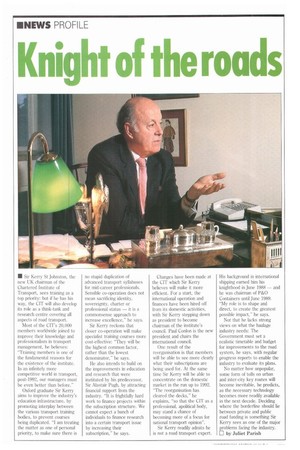Knight of the roads
Page 12

If you've noticed an error in this article please click here to report it so we can fix it.
• Sir Kerry St Johnston, the new UK chairman of the Chartered Institute of Transport, sees training as a top priority:. but if lie has his way, the CIT will also develop its role as a think-tank and research centre covering all aspects of road transport.
Most of the CIT's 20,000 members worldwide joined to improve their knowledge and professionalism in transport management, he believes: "Training members is one of the fundamental reasons for the existence of the institute. In an infinitely more competitive world in transport, post-1992, our managers must be even better than before."
Oxford graduate Sir Kerry aims to improve the industry's education infrastructure, by promoting interplay between the various transport training bodies, to prevent courses being duplicated. "I am treating the matter as one of personal priority, to make sure there is no stupid duplication of advanced transport syllabuses for mid-career professionals. Sensible co-operation does not mean sacrificing identity. sovereignty, charter or professional status — it is a commonsense approach to increase excellence," he says.
Sir Kerry reckons that closer co-operation will make specialist training courses more cost-effective: "They will be the highest common factor, rather than the lowest denominator," he says.
He also intends to build on the improvements in education and research that were instituted by his predecessor, Sir Alastair Pugh, by attracting financial support from the industry. "It is frightfully hard work to finance projects within the subscription structure. We cannot expect a bunch of individuals to finance research into a certain transport issue by increasing their subscription," be says. Changes have been made at the CIT which Sir Kerry believes will make it more efficient. For a start, the international operation and finances have been hired off from its domestic activities, with Sir Kerry stepping down as president to become chairman of the institute's council. Paul Conlon is the new president and chairs the international council.
One result of the reorganisation is that members will he able to see more clearly what their subscriptions are being used for. At the same time Sir Kerry will be able to concentrate on the domestic market in the run up to 1992. "The reorganisation has cleared the decks," he explains, "so that the CIT as a professional, apolitical body, may stand a chance of becoming more of a focus for national transport opinion". Sir Kerry readily admits he is not a road transport expert. His background in international shipping earned him his knighthood in June 1988 — and he was chairman of P&O Containers until June 1989. "My role is to shape and direct, to create the greatest possible impact," he says.
Not that he lacks strong views on what the haulage industry needs: The Government must set a realistic timetable and budget for improvements to the road system, he says, with regular progress reports to enable the industry to evaluate its plans.
No matter how unpopular, some form of tolls on urban and inter-city key routes will become inevitable, he predicts, as the necessary technology becomes more readily available in the next decade. Deciding where the borderline should lie between private and public road funding is something Sir Kerry sees as one of the major problems facing the industry. LI by Juliet Parish












































































































